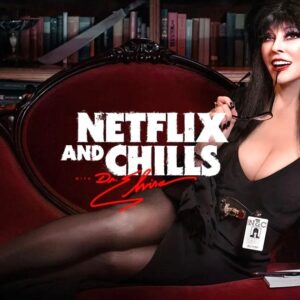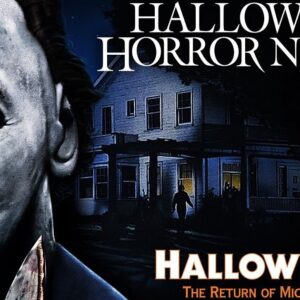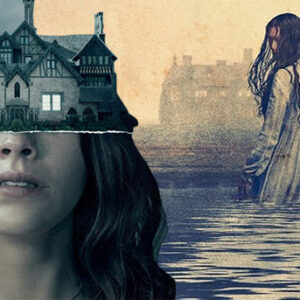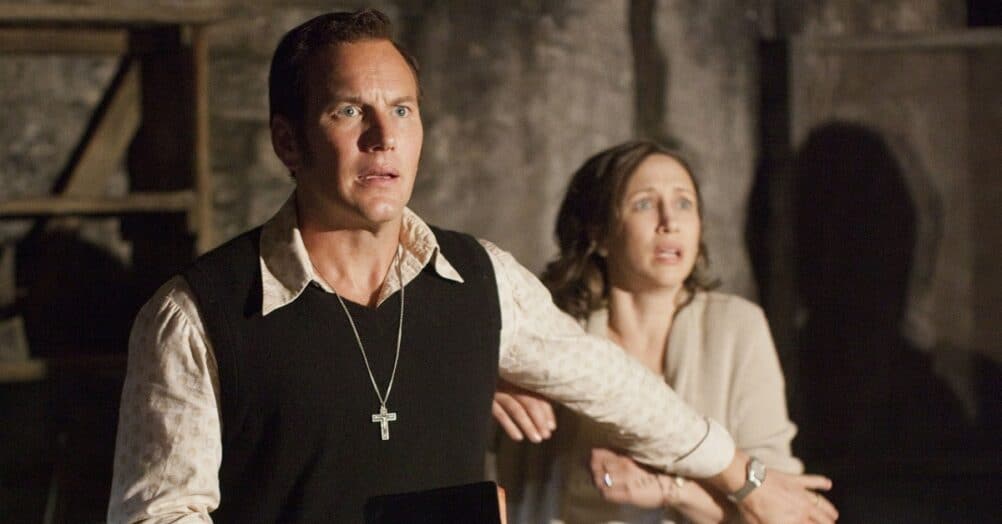Last Updated on July 30, 2021

It’s October now, time to scare ourselves silly with movies and programs from years past as well as fresh titles that have a shot at becoming new classics. One such title is Mike Flanagan’s adaptation of Stephen King’s GERALD’S GAME, just released by Netflix and offering chills of both overt and subtle varieties. On the surface, the tale of a woman chained to a bed while a hungry dog, a potential phantom and the warring voices in her head circle her is a creepy blast, with a handful of squirm-inducing sequences already firmly ensconced in my brain. But on a more troubling level, GERALD’S GAME is about abuse and repression, as our main character Jessie is forced to confront the horrors of her past in order to escape the deadly present.
The film recently made its world premiere at Fantastic Fest, and I was there to chat with the film’s two excellent stars: Carla Gugino, who plays frightened, determined Jessie Burlingame, and Bruce Greenwood who plays Gerald, who dies early on of a heart attack and yet continues to belittle Jessie throughout her terrible ordeal thanks to Jessie’s very active imagination (which also brings to life a second, more proactive version of her subconscious). Both give superb performances, elevating the already potent material and showing us how powerful a movie like this can be if done with enough care and respect.
In the below interview, I speak with Carla and Bruce about the messages within Gerald’s Game, their connections to Stephen King, working with Flanagan, faking heart attacks, and getting in too deep with a terrified dog.
What was your connection to Stephen King and Gerald’s Game before signing on to do the movie?
Greenwood: It was the first time I read it. I knew Stephen because I had worked with him before [on “Ghost Brothers of Darkland County”], and when this came up I read it. There are some very powerful themes, and an opportunity to play with someone one-on-one that you don’t often get. Two-handers don’t come up that often, and I watched some of Mike [Flanagan]’s other films and talked to him and thought, “This sounds like a great, great idea.” Then Carla came aboard and there was just this wash of relief that went through the room, and it was then you realized there was something there to really get into.
Gugino: I hadn’t read Gerald’s Game, and it’s funny because as a kid I was a Stephen King fan. I read Pet Sematary-
Greenwood: I auditioned for that.
Gugino: Did you? Wow.
For the lead role?
Greenwood: I can’t remember, I just remember getting the script and seeing how it was spelled.
Gugino: That’s so funny. I just remember those years where the things that you read and watched took you by storm, and Pet Sematary freaked me out so badly. He is the master, right? In terms of this genre, there’s no one who has been as prolific. His book On Writing is so brilliant. Really, really smart and concise. But I hadn’t read Gerald’s Game, and I wasn’t even familiar with Mike’s work either. So the context that I had was that it was a Stephen King adaptation, and I think I had seen Oculus, so I knew he was good, but I hadn’t seen his whole body of work. I read it and it was shooting quickly, so all of the decisions had to be made very fast, so within about 48 hours I read it, I was super intrigued, I was then completely terrified, I needed to talk to Mike, then I needed to watch Hush, which I thought was so good. What I think is so fascinating about him is that he takes the notion of a slasher movie or a psychological thriller or even Ouija 2, which he made a much better movie than it ever needed to be. He takes these templates and then he pulls back and doesn’t do anything cheap, everything has this sort of elegance and austerity to it. Then he casts actors who have a lot of heart, so it’s a really interesting juxtaposition. So anyway, I basically was like, “This scares me enough that I should do it,” and within a week I was down there on set.
Did you read the book beforehand, or just the script?
Greenwood: The book.
Gugino: I read the book when I was down there.

The dynamic between you two is so interesting, it’s so playful sometimes and other times it’s so disturbing. What was shooting like, what was the atmosphere on set?
Greenwood: We had the luxury of shooting it all in sequence, all the stuff in the cabin, and we also had the luxury of an hour of rehearsal every morning. Every night after shooting we’d discuss what had happened and how that would effect tomorrow and what we were planning, and knowing that Plan A is going to evolve into Plan B and Plan C, which Mike always absorbed even if it didn’t coincide with what he’d originally envisioned. So despite being very prepared, he was also willing to go [gasp]. And a light would go on as a result of something we had invented or something we stumbled on.
Carla: You just reminded me of that one sequence, where Jessie has it all come back and we finally reveal everything that’s happened. And he had planned 42 shots or something, there were so many shots in that sequence, and I went to him with my heart in my hand. I always want to serve what the needs are, visually, and I will always try anything and try to break it up like that, but in this particular one it just felt so clear that scene needed to run, to break that up would have been inorganic to what was happening to her. And Mike, right away was like, “Let me figure this out.” And he came back and was like, “We cut it down to seven shots.” It was amazing, and it was the wonderful world that I give him full credit for creating for us, which was always open for communication. It was also great because there was not a single amount of ego involved on the set at all, it was all of us just trying to make the best movie, and therefor you cut out a lot of bullshit.
Greenwood: He really listens. He has such respect for actors that he recognizes sometimes, “I hadn’t seen that, I hadn’t thought of it that way.” He’s very open to those revelations.
Carla, you are in the unique position of acting opposite yourself, almost. I don’t know how that plays out on set, but are you thinking, “I’m talking to myself right now”?
Gugino: It’s super surreal, right? There were logistical, tangible elements, like someone else is actually standing there and I’m not talking to myself, but it was more weirdly like, we talk to ourselves so much, ad nauseam, those voices inside of you that go, “You can do this” and the other voice that’s like, “I don’t want to do this, can I please make this go away!”

This might be a morbid thought, Bruce, but the scene where you have your heart attack is so convincing and scary, and obviously you have to put a lot of thought into what that would feel like, does that kind of trip you out in a weird way?
Greenwood: That was actually fun, that was a weird, fun challenge to find a place that felt out of control, but conscious enough. You’re conscious enough, it’s confusing you’re out of control, and you don’t quite understand what’s happening. That whole process was always fun. I suppose I personally live in fear of that. I’ve had friends who’ve suffered heart attacks and lived to tell about it, so I reached into that a bit.
Gugino: But looking at you doing it, being the other person in the scene, was very difficult for me. I have to say, very rarely do I feel like I can’t watch someone acting anything, but this did seem so real. I remember in rehearsal I was like, “I can’t do it, it’s just too upsetting.” It was just so alarming.
I have to say, this dog in the film is one of the great screen dogs I’ve seen in a while. Do you have any good stories about him?
Gugino: I do. That dog was pristine and a brilliant actor… until the moment when my arm was in his mouth. And they had gotten him all riled up-
Greenwood: And then he became very method!
Gugino: He did, he became extremely method. He clamped like you couldn’t believe. He broke the skin, but it turned out to be fine. I think, frankly, he was just as scared as I was. He was so much stronger than I anticipated him being, I truly was terrified. I can’t blame him, but it was very scary, and we decided to do it with the puppet. Mike held the puppet head.
Greenwood: We have some great shots of that, with his shoulder deep in this dog’s head, and Mike’s face is as voracious and as mad as the dog’s.
Besides it being just a great horror movie, viscerally, the movie is about so much more, deep, disturbing stuff. What do you hope the audience leaves thinking about the overall experience?
Greenwood: Stephen’s original premise was about this woman who was abused as a child and oppressed and silenced for all this time having to do the brutal homework of acknowledging what’s happened to her in order to be free.
Gugino: I think you could kind of get Jungian about it, but the point is, the shadow holds the power if you’re unwilling to look at it. It can be so incredibly painful, but if you’re willing to look at it straight in the face, you will be free. I think it’s so incredibly fitting that our master of this genre has chosen this, because those things do feel like hero’s journeys, they are archetypal, they do feel massive when you have to confront those kinds of things, especially when they happen to you when you’re a kid, and by people you trust and love in this case. I do think the fact that the elements are heightened in this genre is really a perfect way to tell a story like this, rather than the after-school special version.
Carla, you’re working with Mike again on The Haunting of Hill House TV series; what can you tell me about that?
I know that I’m not even supposed to reveal who I’m playing, I don’t think. Obviously it’s an amazing novel, so the source material that it’s being inspired by is of good stock. I know Stephen King talks about it being the best haunted house novel of all time. Totally different role, and what Mike [Flanagan] was telling me about it, what I was so intrigued by, is it’s dealing with not just ghosts the way we think of them in a haunted house, but the ghosts we have to live with, that we have to reconcile with. And it’s about family, and about the hidden grievances and denials and how they ultimately make us who we are.
All I can say is that I have a journey as a character to a place I’ve never gone before, and don’t know how I’m going to do it yet either. I go in with some excitement and terror yet again!





















Follow the JOBLO MOVIE NETWORK
Follow us on YOUTUBE
Follow ARROW IN THE HEAD
Follow AITH on YOUTUBE